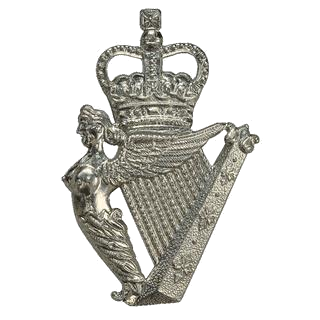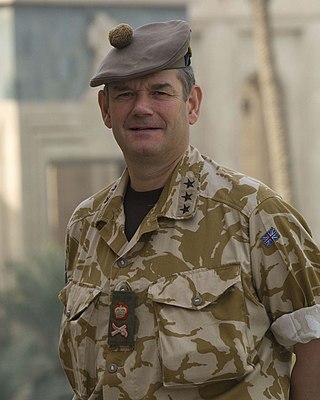
General Sir Michael David Jackson, is a retired British Army officer and one of its most high-profile generals since the Second World War. Originally commissioned into the Intelligence Corps in 1963, he transferred to the Parachute Regiment in 1970, with which he served two of his three tours of duty in Northern Ireland. On his first, he was present as an adjutant at the events of the Ballymurphy massacre (1971), where eleven unarmed civilians were shot dead by British troops, and then at Bloody Sunday in 1972, when British soldiers opened fire on unarmed protesters, killing fourteen. On his second, he was a company commander in the aftermath of the Warrenpoint ambush (1979), the British Army's heaviest single loss of life during the Troubles. He was assigned to a staff post at the Ministry of Defence (MoD) in 1982 before assuming command of the 1st Battalion, Parachute Regiment, in 1984. Jackson was posted to Northern Ireland for the third time, as a brigade commander, in the early 1990s.

The Royal Irish Regiment is a light infantry regiment of the British Army. The regiment was founded in 1992 through the amalgamation of the Royal Irish Rangers and the Ulster Defence Regiment. Their oldest predecessor, the 27th Regiment of Foot, was first raised in June 1689 to fight in the Williamite War in Ireland. Other notable regiments in their lineage include the Royal Inniskilling Fusiliers, Royal Irish Rifles and the Royal Irish Fusiliers.

Lieutenant General Jonathon Peter Riley, is a retired British Army officer and military historian.

General Sir John George Reith, is a retired senior British Army officer who was the Deputy Supreme Allied Commander Europe within the North Atlantic Treaty Organization (NATO) from October 2004 to October 2007.

General David Julian Richards, Baron Richards of Herstmonceux, is a retired senior British Army officer and Peer who was formerly the Chief of the Defence Staff, the professional head of the British Armed Forces. He succeeded Air Chief Marshal Sir Jock Stirrup in this role on 29 October 2010.
General Sir Rupert Anthony Smith, is a retired British Army officer and author of The Utility of Force. He was a senior commander during the Gulf War, for which he was recognised with the award of the Distinguished Service Order (DSO), and again during the Bosnian War, for which he was recognised with the award of a bar to his DSO. He later became Deputy Supreme Allied Commander Europe.

General Sir Nicholas Ralph Parker, is a former British Army officer who served as Commander Land Forces until December 2012.

General Sir Gordon Kenneth Messenger, is a retired senior Royal Marines officer who served as Vice-Chief of the Defence Staff from May 2016 to May 2019. As a colonel he commanded 40 Commando during the Iraq War, and led the Commando in the assault on the Al-Faw Peninsula. He served as British Commander of Task Force Helmand, during the 3 Commando Brigade deployment to Helmand Province, Afghanistan on Operation Herrick IX from 2008 to 2009. After his retirement, Messenger has held ceremonial positions, including Lord High Steward at the coronation of King Charles III in 2023.

Lieutenant General John Cooper, is a former senior British Army officer. From March 2008 he was the Deputy Commander of Multinational Force-Iraq (MNF-I), the operational-level headquarters in Iraq, and the Senior British Military Representative-Iraq. As Deputy Commander, he was the principal assistant to General Raymond T. Odierno of the United States Army. He stepped down on 4 March 2009, and retired from the army later that year.

Lieutenant General Sir Hew William Royston Pike is a retired senior British Army officer known for his service in the Falklands War and for his command in Northern Ireland.

General Sir Richard Lawson Barrons, is a retired British Army officer. He was Commander Joint Forces Command from April 2013 until his retirement in April 2016.

Lieutenant General Sir James Jeffrey Corfield Bucknall, is a retired British Army officer and former Commander of the Allied Rapid Reaction Corps.

Lieutenant General Sir John Gordon Lorimer, is a retired senior British Army officer, who served as the Chief of Joint Operations and the Defence Senior Adviser to the Middle East and North Africa. He was appointed Lieutenant Governor of the Isle of Man on 29 September 2021.

Lieutenant General Timothy Paul Evans, is a retired British Army officer, who served as Commandant of the Royal Military Academy Sandhurst from 2012 to 2013 and then commander of the Allied Rapid Reaction Corps from 2013 to 2016.
Lieutenant General Sir Thomas Anthony Beckett, is a former British Army officer. He served as Chief of Staff for the International Security Assistance Force in Afghanistan.
Lieutenant General Giles Patrick Hill, is a retired senior British Army officer. He commanded the 1st Division from 2015 to 2017, was Assistant Chief of the Defence Staff from 2017 to 2019, and served as the Deputy Commander of NATO's Resolute Support Mission in Afghanistan from 2019 until December 2020.

Lieutenant General Sir Nicholas Robert Macrae Borton,, is a retired British Army officer, who served as commander of NATO's Allied Rapid Reaction Corps from 2021 to 2024.

Lieutenant Colonel (Retd) Usman Adewale "Oz" Alashe, MBE is a tech entrepreneur and former British Army officer who served in the Parachute Regiment and United Kingdom Special Forces. He was the first black British officer to serve in both elite military organizations and is a veteran of the wars in Afghanistan and Iraq.















